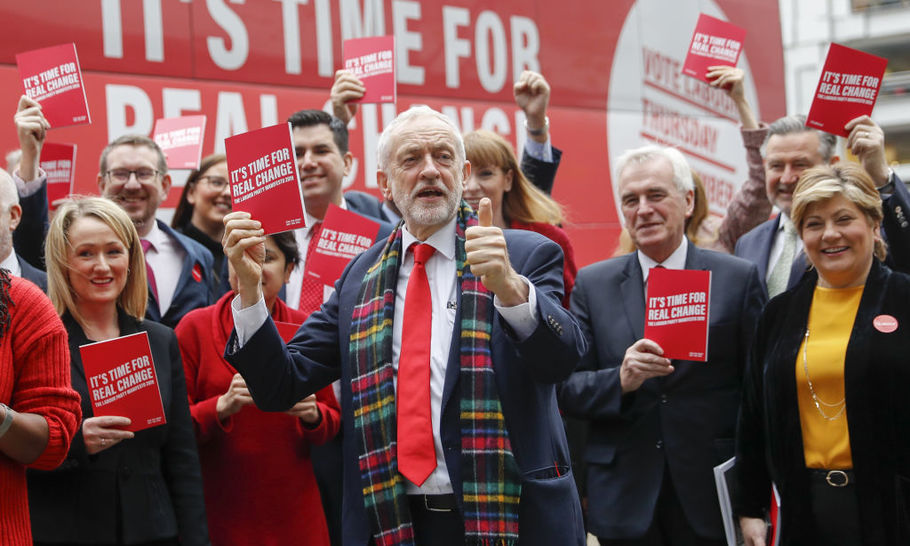Labour’s manifesto means the destruction of the British bourgeoisie

Photographer: Darren Staples/Bloomberg via Getty Images
The spending figures are astronomical, the claims and counter-claims bewildering, but the shape that emerges from the chaos surrounding Labour’s programme is as terrifying as the Martian invasion in The War of the Worlds by HG Wells. Jeremy Corbyn is proposing to create a siege economy, with a leviathan state not seen since 1945. If he is allowed to get his hands on the levers of power, in short order he will bankrupt the country.
These numbers alone read like the sick fantasy of a fanatical cadre. Even without costing the nationalisation programme or freezing the pension age, the Labour manifesto would raise public spending by at least £130 billion, or six per cent. This would push the share of GDP spent by the state from 39.7 per cent to 45.1 per cent. Even if a flight of capital and other market forces obliged Labour to curtail its more extravagant plans, by 2024 government spending would almost certainly be exceeding £1 trillion for the first time and borrowing would have ballooned.
Labour promises that only the top five per cent will pay for the largest ever expansion of state spending in peacetime. They are oblivious of the fact that this same five per cent already pays half of all income tax and an even higher percentage of other taxes. Penal taxation over and above these already onerous burdens will drive the richer members of this British bourgeoisie out of the country and ruin the rest.
It is the mendacity of this threat to soak only the rich that is most striking, however. One of the most glaring anomalies is the threat to scrap the married tax allowance, for which only lower earners qualify at present. Taxing share dividends and capital gains (for example on second home sales) at the same rate as income would hit millions of “ordinary” taxpayers. Indeed, anybody with a pension fund or an ISA will be affected by the carnage that is bound to ensue on the stock markets if Labour wins.
One of the most depressing revelations of this campaign has been the feeble response from those who should know better. Business representatives such as the CBI and the IoD are running scared. They fear that speaking out about the catastrophic implications of Labour’s manifesto would be falling into the trap that John McDonnell has laid for them. Hence their criticisms of Labour have been muted. They are going to the slaughter without so much as a squeak.
The same applies to respected think tanks and economists, who are already seeking non-existent silver linings. Paul Johnson, Director of the Institute for Fiscal Studies, writes in the Times: “There is a good case for changing the model of capitalism here to one more like the French, German or Scandinavian systems.” Has he spoken to any French entrepreneurs recently? There is a reason why they have hitherto preferred to be based in London rather than Paris. Labour is proposing to render the UK at least as inhospitable to new businesses as France, thereby negating any future benefits of Brexit.
Indeed, one of the biggest of an entire herd of elephants in Labour’s room is the fact that much of its programme would be illegal under EU rules, which prohibit nationalisation. Yet the party’s manifesto proposes a second referendum next year and refuses to tell us on which side it would campaign. If the country voted to Remain, Labour would either have to junk its plans or have them ruled illegal by the European Court of Justice.
Corbyn and McDonnell have never made any secret of their Marxist convictions. They believe that the immiseration of the middle class is a price worth paying for socialism in one country. Stalin’s phrase still sends shivers down the spines of those who remember Eastern Europe before 1989. Yet the class warfare that permeates its programme means that Labour has now embraced the dictatorship of the proletariat.
The working class, of course, has shrunk and largely despises a party that scorns its aspirations. Nothing daunted, Labour intends to create two new classes: one of clients, the other of bureaucrats. Both will be equally parasitical on Labour’s leviathan state. The clients will be dependent on subsidies, benefits and free public services, living in council houses. The bureaucrats will make their living from the state too, but will do much better out of it.
From such unaccountable power, many dangers arise — as every socialist country in history has demonstrated. In the postwar era, Douglas Jay’s unforgettable phrase still resonates: “The gentleman in Whitehall really does know best.” Yet the socialism of the Attlee government was moderate compared to what we could expect from Labour now. Jeremy Corbyn and John McDonnell, after all, are no gentlemen.





